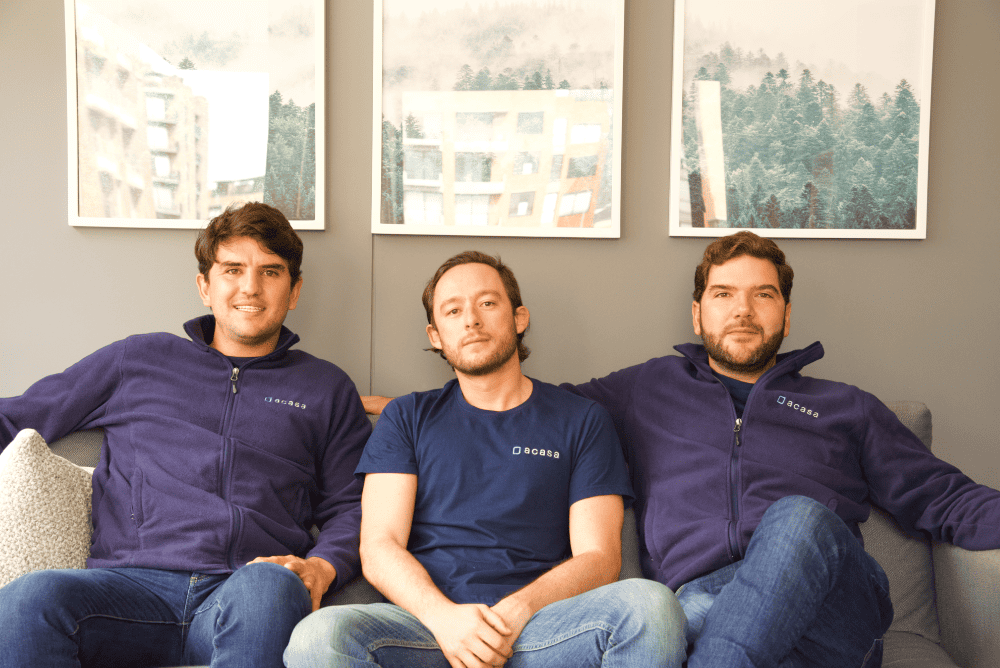
Por Paola Villarreal
March 16, 2022
Colombian company Acasa announced it has raised US$38 million (US$4.7 million in seed capital and US$33 million in debt). The round was led by Quona Capital and is one of the fund’s first investments in a Latin American proptech company.
Other participating investors included Metaprop, Wollef –who had led a previous round in May 2021– and Y Combinator. Several individual founders, including Cyril Berdugo (Landis), Brian Ma (Divvy Homes), Dileep Thazmon (Jeeves), Daniela Izquierdo and Juan Guillermo Azuero (Foodology), and Daniel Vallejo (Addi), also invested. Architect Capital financed the debt.
With these new funds, Acasa will focus on increasing its operations in Colombia and supporting its expansion into Mexico.
Acasa is the first proptech company with the “buy before you sell” model in Latin America. Its counterparts (and inspiration) in the US include Knock, Orchard, Fly Homes, and Homeward.
The company makes it easy for homeowners to purchase a new home without needing to sell their old property. It does this by making down payment loans, signing up for the new mortgage, and handling the sale of the old house. Through its website, Acasa allows potential clients to pre-qualify in less than 48 hours.
The investment in Acasa comes at an interesting time for proptech companies in Latin America. In 2021, more than US$21 million were invested in this sector, which includes startups such as Loft in Brazil, and Habi and La Haus in Mexico and Colombia.
Acasa started just a year ago in Colombia. Its three founders, Mauricio Peñaranda (COO), Eduardo Restrepo (CFO), and Nicolás Peñaranda (COO), were real estate investors for almost 15 years.
During this time they noticed the main deficiencies and inefficiencies of the market, including homeowner illiquidity, very small caps for bank loans, exhausting processes to sell a property, and little transparency in market prices.
Upon discovering the “buy before you sell” model in the US, the Acasa team implemented it in Latam, starting with Colombia. The lockdown restrictions in 2020 proved a good time to do it.
“The pandemic was terrible for many things, but it was very positive for the residential real estate sector,” says Acasa’s CEO. “People realized that they had to live in their homes and adapt to that moment of their lives. In Colombia and Mexico, the two previous years have had record house sales because people have been moving around.”
Peñaranda also explains that Acasa seeks to become an ally in choosing how to live at each stage of life. “People get married and need a home. They have their first, second or third child and they need to adapt their housing needs. There are children who leave and their parent or parents realize they don’t need such big houses anymore,” he points out, emphasizing that the first property that one acquires is rarely the definitive one.
To first expand into Mexico and eventually to other Latin American countries, the Acasa team has taken into consideration the differences in operations in each country. For example, Colombia doesn’t have a government entity like the Mexican INFONAVIT, which grants access to housing. According to the company’s CFO, Acasa is analyzing how to integrate this player into their strategy in Mexico.
This market is key for Acasa, as it is 5 times larger than the one in Colombia and shares the same weaknesses in terms of real estate. “Transforming the product in each region has been one of the biggest challenges,” concludes Restrepo, the company’s CFO.
You may also be interested in: The 10 Latam Startups That Are Already Y Combinator Top Companies

Por Stiven Cartagena
January 12, 2026